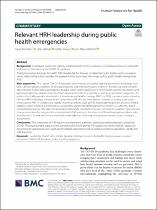Relevant HRH leadership during public health emergencies

View/
Date
2022Author
Poz, Mario Dal
Kovacs, Eszter
Lehman, Uta
Ferrinho, Paulo
Metadata
Show full item recordAbstract
Background: Inadequate leadership capacity compounds the world’s workforce lack of preparedness for outbreaks
of all sizes, as illustrated by the COVID-19 pandemic.
Traditional human resources for health (HRH) leadership has focused on determining the health workforce requirements, often failing to fully consider the unpredictability associated with issues such as public health emergencies
(PHE).
Main arguments: The current COVID-19 pandemic demonstrates that policy-making and relevant leadership have
to be efective under conditions of ethical uncertainty and with inconclusive evidence. The forces at work in health
labor markets (HLM) entail leadership that bridges across sectors and all levels of the health systems. Developing and
applying leadership competencies must then be understood from a systemic as well as an individual perspective. To
address the challenges described and to achieve universal health coverage (UHC) by 2030, countries need to develop
efective HRH leaderships relevant to the complexity of HLM in the most diverse contexts, including acute surge
events during PHE. In complex and rapidly changing contexts, such as PHE, leadership needs to be attentive, nimble,
adaptive, action oriented, transformative, accountable and provided throughout the system, i.e., authentic, distributed and participatory. This type of leadership is particularly important, as it can contribute to complex organizational
changes as required in surge events associated with PHE, even in in the absence of formal management plans, roles,
and structures. To deal with the uncertainty it needs agile tools that may allow prompt human resources impact
assessments.
Conclusions: The complexity of PHE requires transformative, authentic, distributed and participatory leadership
of HRH. The unpredictable aspects of the dynamics of the HLM during PHE require the need to rethink, adapt and
operationalize appropriate tools, such as HRH impact assessment tools, to redirect workforce operations rapidly and
with precision.
